The head of the Federal Reserve Bank of Boston says economic growth over the next year will continue, although at a less-than-robust pace for the rest of the year.
Eric Rosengren, speaking Wednesday before the annual meeting of The Research Bureau at Worcester’s DCU Center, said that despite 11 consecutive quarters of growth in the nation’s economic output, or gross domestic product (GDP), and a drop in unemployment from 10 percent to 8.1 percent, “the economic recovery and the improvement in the unemployment rate continue to be frustratingly slow,” he said in prepared remarks before he addressed the afternoon gathering of about 300.
Rosengren predicted that growth will fall in right around its potential rate of 2 to 2.5 percent, though he acknowledged, “we need faster growth than that.” His prediction assumes the European economy will be able to “muddle through” its current problems and that the U.S. Congress and federal policymakers avoid falling off a “fiscal cliff.” To avoid that and help spur growth, Rosengren believes certain factors in the federal government’s control that will take effect after the end of the year – such as the expiration of the payroll tax cut, revisions to the Alternative Minimum Tax, the expiration of the so-called “Bush tax cuts, and automatic spending cuts associated with the Budget Control Act of 2011 – will restrain growth “by a significant fraction of GDP.”
That’s part of the reason he believes the Fed should continue its “accommodative” monetary policy of low interest rates to help boost growth. “I believe further monetary policy accommodation is both appropriate and necessary,” he said in his prepared remarks. “The U.S., like many other countries, needs to facilitate a more rapid recovery, and monetary policy is one important tool with the potential still for encouraging faster growth.”
Labor Market Concerns
Rosengren said he remains “especially concerned” about ongoing weakness in the labor market. But that, he added, is not due to shortages of specific skills or labor shortages in specific regions. “This is not to dismiss entirely some structural components of the current high unemployment rate,” he said in his prepared statement. “Certainly there are situations where the skills of people who had lost jobs were not well aligned with the skill sets needed in some sectors that are hiring, such as advanced manufacturing and health care.”
Rather, he said, most of the problem with the labor market is tied to economic cycles. He supported that with data that showed consistent job growth and losses across all parts of the United States. One reason for that similarity across regions is that two weak sectors, state and local government spending and residential investment, remain much weaker than usual for this stage of an economic recovery, and have been impacting all regions.
Rosengren also said “we’re finally getting some improvement” in the housing market, with all regions of the U.S. moving forward “in lock step.”
Overall, “a good outcome is modest growth,” he said, but “there are just some unforeseen consequences (such as Europe and what Washington decides on fiscal policy) that we have to worry about.”

